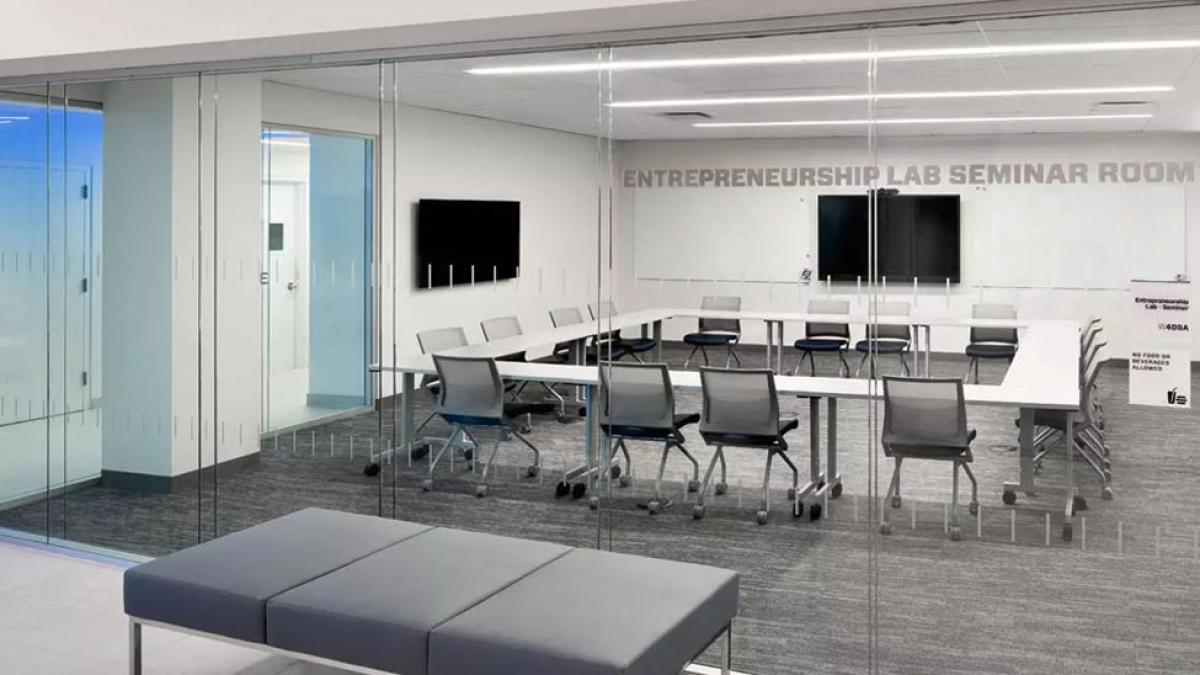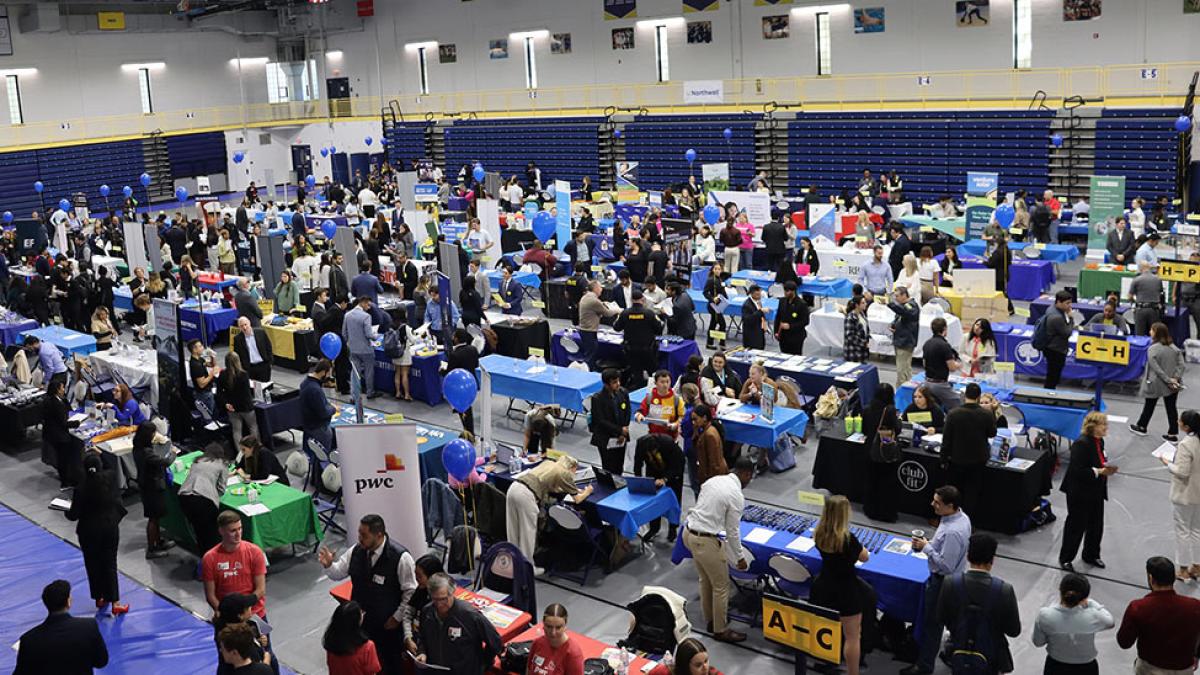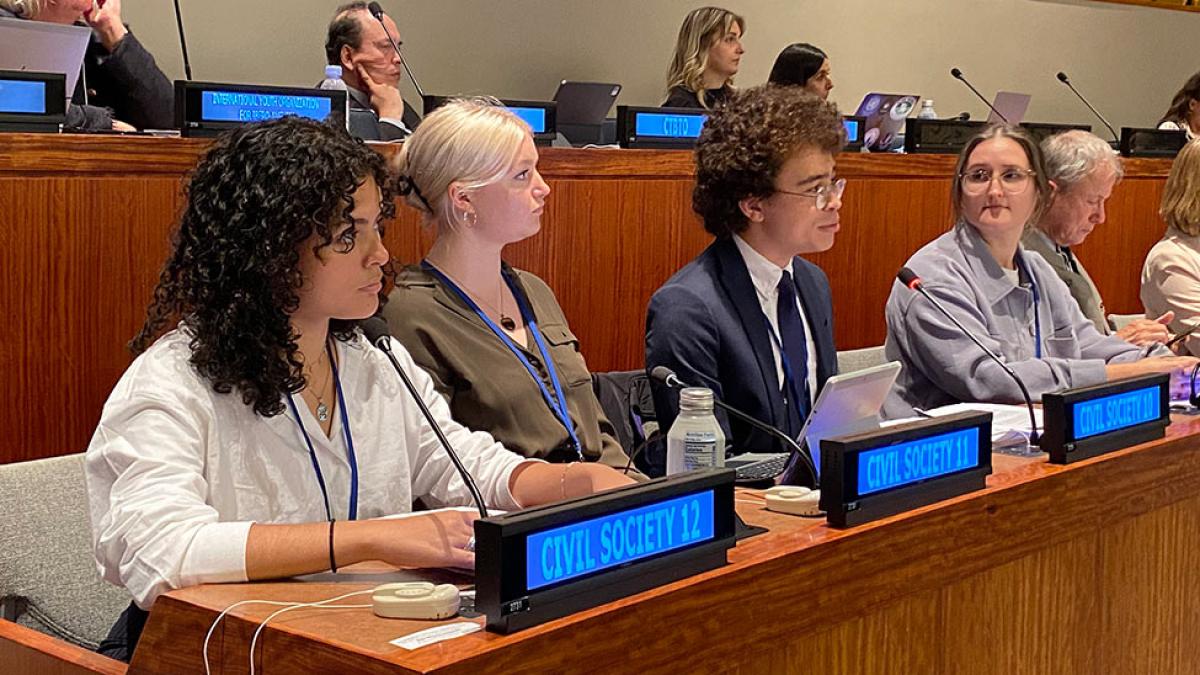Nishant Doshi moved from India to New York to make the most of the opportunities Pace has to offer—and he’s succeeding.
Enabling Greater Success for Autistic Students
Seidenberg professor James Lawler was awarded Best Conference Paper and Best Paper of the Innovative Education, Pedagogy and Teaching Track for "A Case Study for Enabling Autistic Students to Enter Best-of-Class Career Programs in Science, Technology, Engineering and Mathematics (STEM)", at the 59th Annual Meeting of the Institute for Operations Research and Management Science.
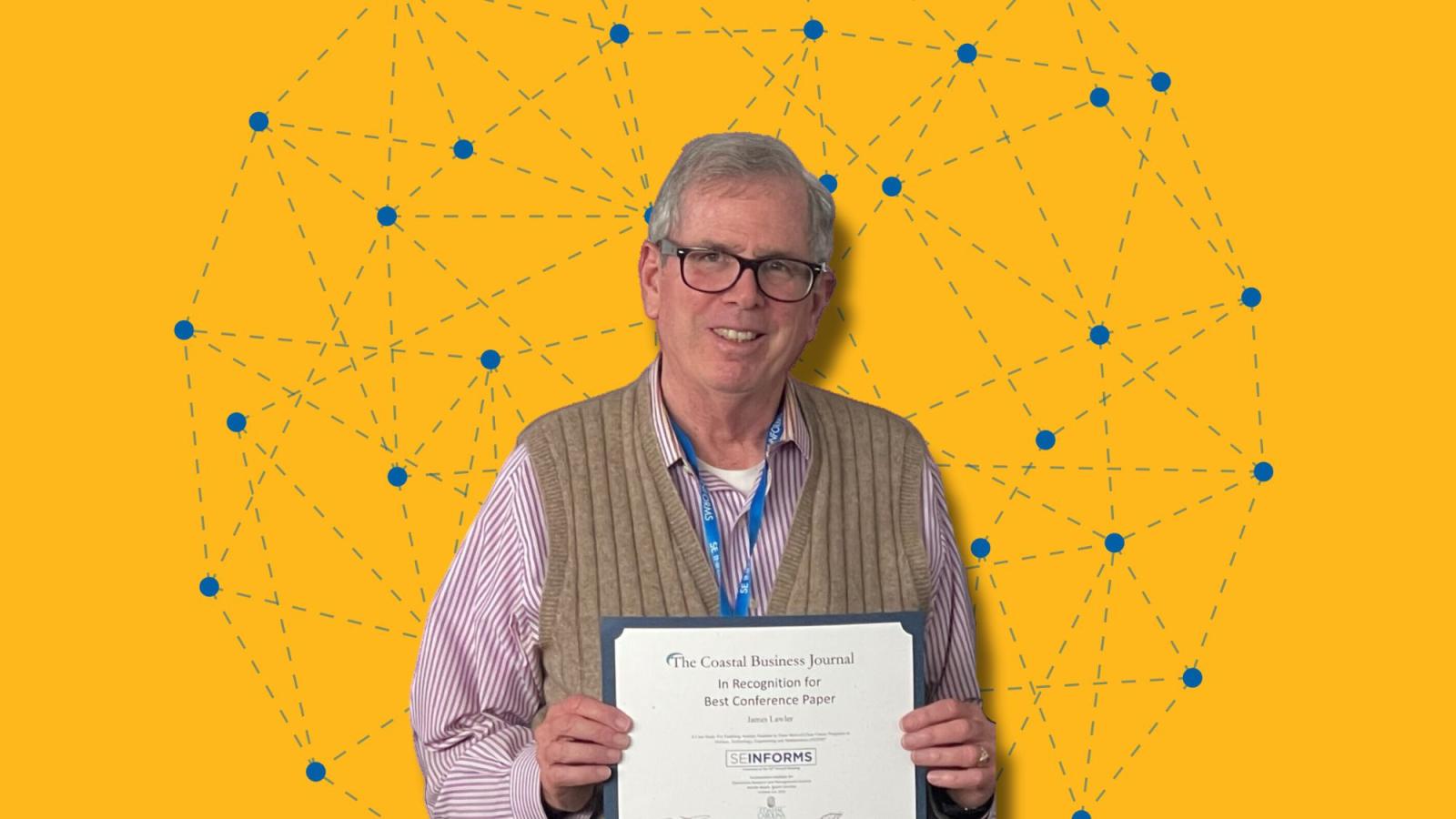
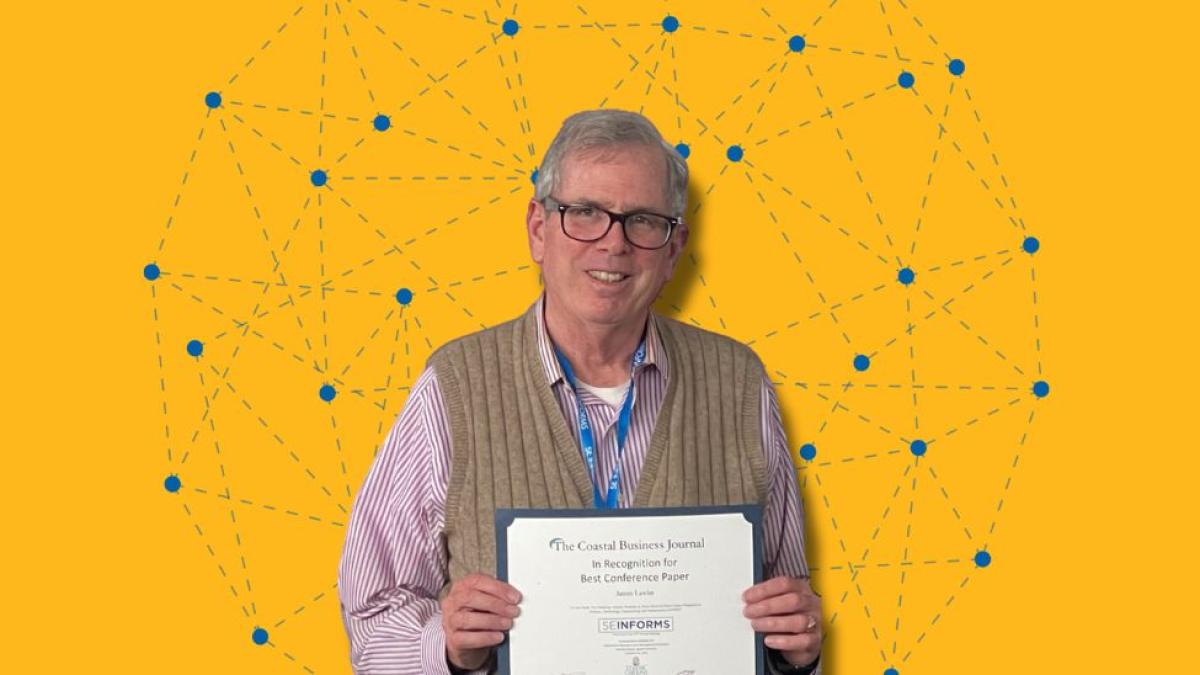
Seidenberg professor James Lawler was awarded Best Conference Paper and Best Paper of the Innovative Education, Pedagogy and Teaching Track for "A Case Study for Enabling Autistic Students to Enter Best-of-Class Career Programs in Science, Technology, Engineering and Mathematics (STEM)", at the 59th Annual Meeting of the Institute for Operations Research and Management Science (INFORMS), in Myrtle Beach, South Carolina, on October 4-6.
The research entailed exploring how, despite a higher rate of inclusion of autistic students in post-secondary schools, the programs into which they are entering may not be enabling the students effectively. While the programs may be academically appropriate, only 34% of students with disabilities enter these programs, and of those, only 39% graduate. The statistics continue to decline further along the students' path—with only 15% of graduating students estimated to be employed in the five years following graduation.
Dr. Lawler proposed that autistic students can be better enabled for success and designed a model to support solutions beyond typical services.
The model includes focus on five constructs: accommodation for curricular in STEM, curricular focus in STEM, extra-curricular growth, health and mentoring services, and opportunities and recognitions. Each area includes a wealth of programmatic and support recommendations to improve the experience for students with autism in STEM programs.
Dr. Lawler has a longstanding history of research and project-based activity related to people with disabilities. He has created several programs and projects at Pace that focus on building better experiences for students. "Most of the Pace students engaging in the programs and projects are students without disabilities learning about those disadvantaged and with disabilities for the first time," he said.
"Programs are also engaging Pace undergraduate students in participating on projects with me with the Mayor's Office for People with Disabilities (MOPD) of the City of New York, such as the Disability Film Festivals that we do at the university. We are fortunate moreover to be partnering with OASIS at Pace University and with Tech Kids Unlimited as we pursue new programs and projects in the fields of diversity and technology at the university."
The conference paper was also awarded competitively for funding by the Helene and Grant Wilson Center for Social Entrepreneurship of the university in 2022.
Additionally, the 10th Anniversary Celebration of People with Disabilities in Films Disability Film Festival at Pace University will be Wednesday, April 10, 2024.
More from Pace
Do you have an innovative solution that can make a positive impact on the environment? Share your ideas by December 19 for the chance to win a $15,000 grant! Join The Front Yard at Pace University and Speedemissions in addressing climate change, protecting the planet, and slowing threats to Earth's ecosystem.
Seidenberg's new faculty member, Jonathan Williams, brings his expertise to the human centered design master's program, where user experience leads technologists, artists, designers, and psychologists to build better, more equitable, and more beautiful things.
Professor Sam Kalen Examines the Future of the Administrative State During Gilbert and Sarah Kerlin Lecture on Environmental Law at Elisabeth Haub School of Law
On Tuesday, October 3, 2023, Sam Kalen delivered the annual Gilbert and Sarah Kerlin Lecture on Environmental Law. Professor Kalen is the William T. Schwartz Distinguished Professor of Law and Associate Dean at the University of Wyoming College of Law, as well as the founder and co-director of the School’s Center for Law and Energy Resources in the Rockies. Also, he is currently the Visiting McKinney Family Chair in Environmental Law at IU McKinney School of Law. The topic of his lecture was “The Supreme Court’s Approach Toward the Administrative State and Implications for Environmental Programs.”
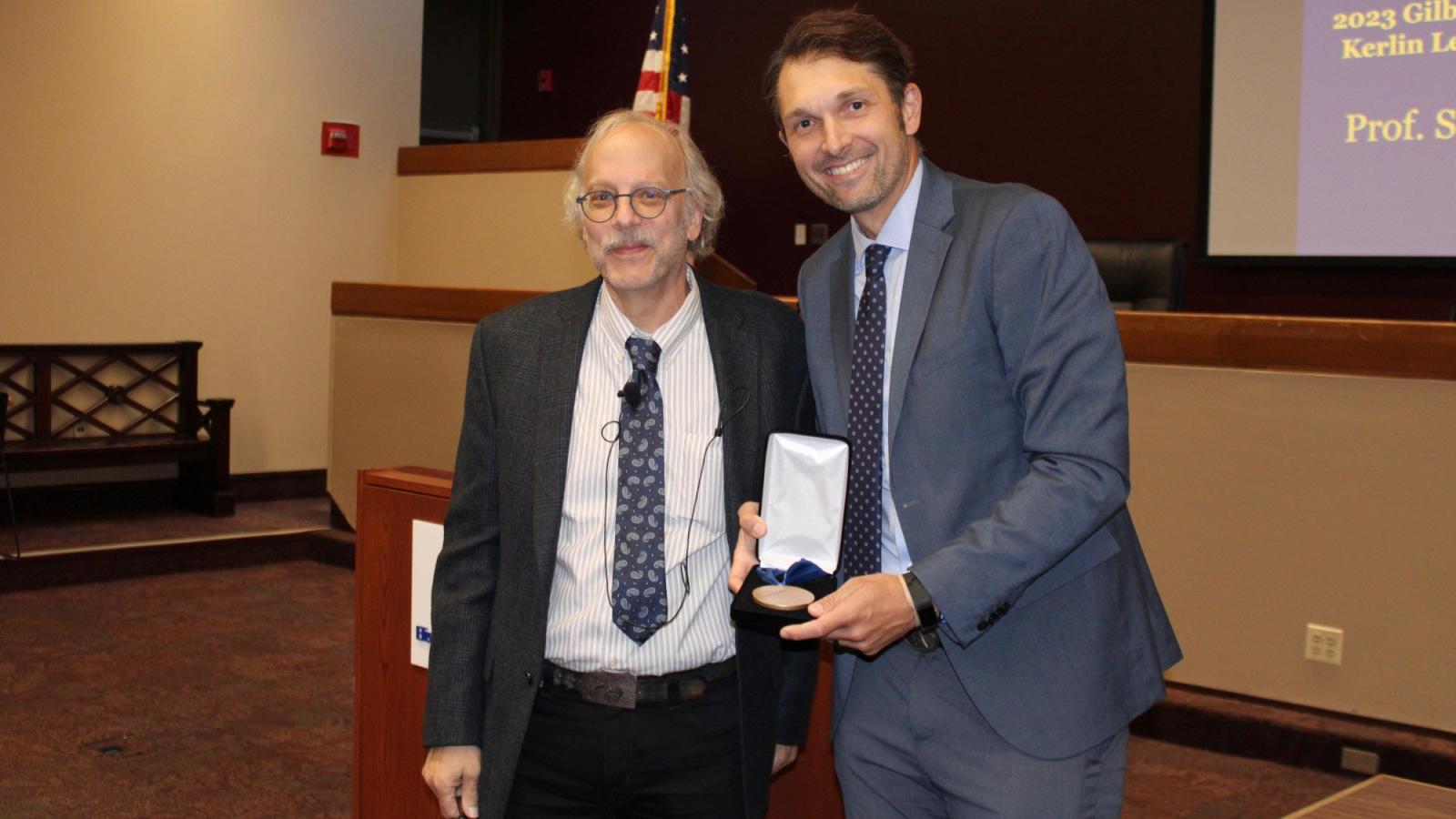
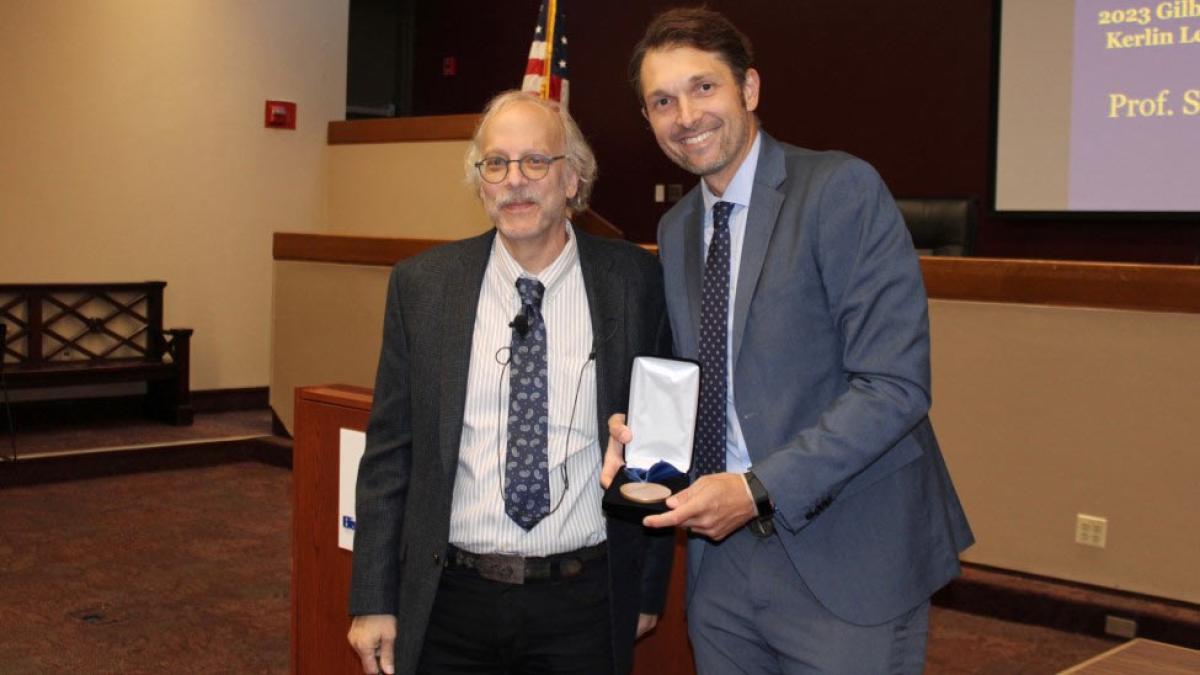
On Tuesday, October 3, 2023, Sam Kalen delivered the annual Gilbert and Sarah Kerlin Lecture on Environmental Law. Professor Kalen is the William T. Schwartz Distinguished Professor of Law and Associate Dean at the University of Wyoming College of Law, as well as the founder and co-director of the School’s Center for Law and Energy Resources in the Rockies. Also, he is currently the Visiting McKinney Family Chair in Environmental Law at IU McKinney School of Law. The topic of his lecture was “The Supreme Court’s Approach Toward the Administrative State and Implications for Environmental Programs.”
Prior to the commencement of the lecture, Jason Czarnezki, Gilbert and Sarah Kerlin Distinguished Professor of Environmental Law and Associate Dean of Environmental Law Programs and Strategic Initiatives thanked all who helped to make this year’s Kerlin lecture happen and introduced the Dean of the Elisabeth Haub School of Law at Pace University, Horace E. Anderson Jr. Dean Anderson spoke of the importance of the Kerlin lecture and the innovative and premiere environmental legal education that Haub Law provides, which includes hosting speakers like Professor Sam Kalen. Dean Anderson noted, “We are consistently honored to host top scholars, dignitaries, attorneys, experts, and leaders in public service, such as Professor Kalen, to speak to our community about current environmental challenges and importantly, solutions to those challenges. This knowledge is fundamental to our understanding of how we apply the rule of law to impact not just us as individual humans, but also our planet.” Professor Jason Czarnezki formally introduced Professor Sam Kalen, in presenting the 2023 Gilbert and Sarah Kerlin Lecture Award, highlighted Professor Kalen’s impressive background and career, including serving in the Solicitor’s Office at the Department of the Interior during the Clinton administration.
Professor Kalen started his lecture by noting that it was fitting to have a lecture about the Supreme Court as the Court’s term just started. In particular, a discussion about how the judiciary is deciding cases, and how those decisions may implicate environmental cases and laws moving forward was warranted given that there are at least three cases set to go before the Supreme Court this year that seek to curb the power of federal agencies.
Throughout the lecture, Professor Kalen shared his concern for the future of the environmental administrative state. “Some of what I may say can be considered depressing for those that cherish our environmental programs,” said Professor Kalen. A focus of Professor Kalen’s lecture was detailing specific environmental law cases, both historical, and more recent, and how the Court at the time approached the administrative state and looking towards the present cases before the Court and future.
Professor Kalen went on to note that the recent case, Sackett v. EPA, is one of the most momentous decisions issued by the Supreme Court narrowing the scope of the Clean Water Act. In this case, the Court considered whether the 9th circuit applied the appropriate test to determine whether Sackett’s property contained wetlands that are “adjacent wetlands” as regulated by the Clean Water Act. While the case deals with the Clean Water Act, he notes, it reduces related environmental rights and the scope of agencies. “Sackett also does something else,” he notes. “It illustrates the Court’s approach towards the administrative state and suggests a greater involvement by the judiciary shifting more power to the courts when interpreting statutes and for our purposes, environmental statutory law.”
“Environmental programs function as a consequence of how the modern administrative state operates,” he said. “Agencies need flexibility to address new and emerging environmental threats and concerns.” Of primary concern, Professor Kalen notes, is that through cases like Sackett, the Supreme Court has employed methods to chip away at the modern administrative state. Professor Kalen’s lecture detailed that recent cases brought before the courts involve three things regarding administrative agencies (1) agency structure; (2) agency authority and flexibility; and (3) the malleability of modern statutory construction.
Professor Kalen concluded his lively lecture, by nothing that what a case like Sackett has done is “basically give the power over to the judiciary to interpret language and not give deference to agencies and, the minute it does that, it hinders agencies ability to move forward in a progressive way.”
After the lecture, audience members had an opportunity to comment and ask questions. The impactful, provocative, and honest discussion continued. In response to an audience question regarding what we can do to move forward in a positive manner, Professor Kalen honestly answered that he does believe we are in trouble. “I think right now the courts are outcome driven. Regardless of how the language is drafted, what we are seeing is judicial opinions doing very strange things from a statutory construction perspective. I wish I could say otherwise or that these are principled decisions, but I think it is difficult for some of us to say that they are in fact principled decisions.” Following the lecture, a networking reception was held where the Elisabeth Haub School of Law at Pace University community had the opportunity to the continue the conversation with Professor Kalen and one another.
The Elisabeth Haub School of Law established the Gilbert and Sarah Kerlin Lecture on Environmental Law to expand its programs of research, education, professional and scholarly activity and publications in environmental law, a field for which the law school has received national and international recognition. The Kerlin endowment funds a named professorship on Environmental Law at Haub Law. Professor Nicholas A. Robinson, founder of the Haub School's environmental programs, was named the first Gilbert and Sarah Kerlin Distinguished Professor in 1999 and Professor Jason J. Czarnezki was designated as the second Kerlin Distinguished Professor in 2013. The last Kerlin lecture was given by U.S. Environmental Protection Agency General Counsel Jeffrey Prieto.
Polarization
Dyson Professor Seong Jae Min writes an op-ed in The Korea Times about polarization in Korea.
I came back to Korea after a long time abroad, and one of the most visible issues that I notice in Korean society today is that of polarization. Polarization generally refers to the splitting of society into conflicting groups such as rich and poor, old and young, and urban and rural, which this rapidly growing and competitive country has experienced quite a good deal over the years. But what makes today’s polarization particularly challenging is its scope and nature. The type of divisiveness Koreans are experiencing now is what some scholars call “affective polarization,” where in-group members exhibit animosity toward out-group members. And it seems to be widespread across Korean society.
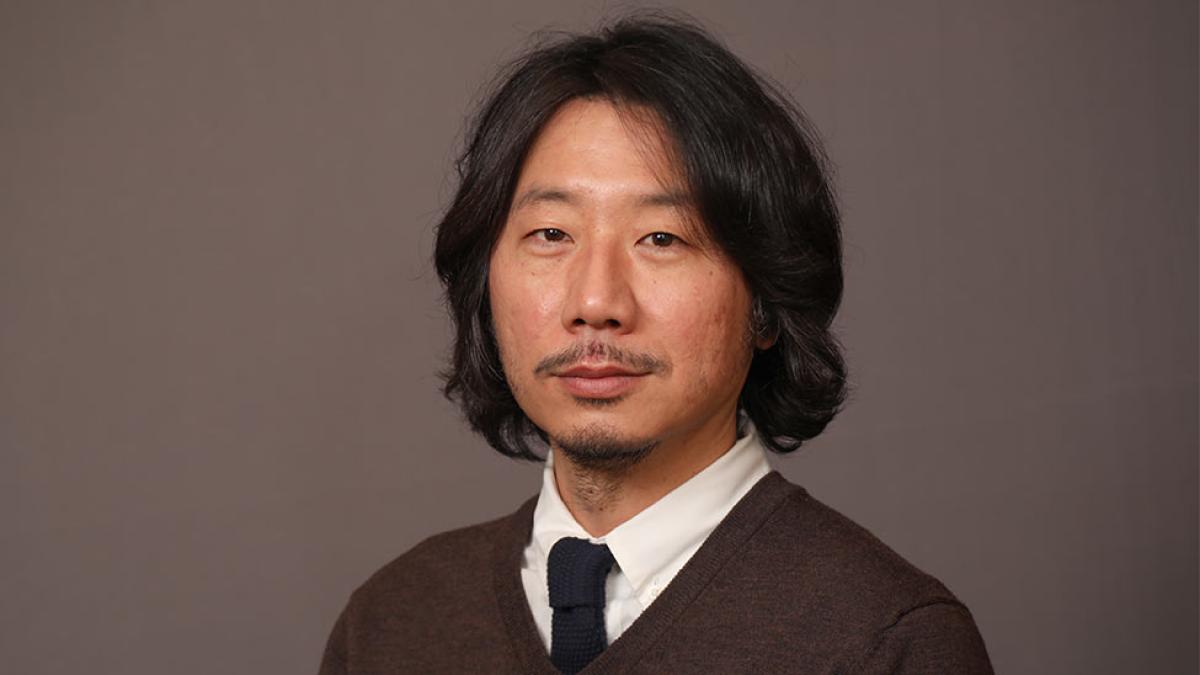
Legal Expert Warns Trump Lawyers Could Face “Disbarment” and “Possibly Be Jailed” Over Court Stunts
Elisabeth Haub School of Law Professor Bennett Gershman speaks with Salon about how former Trump lawyers could face “disbarment” and “possibly be jailed” over court stunts.
“Trump’s lawyers are perilously close to being sanctioned once again and more heavily by Judge Engoron for their misconduct,” Bennett Gershman, a former New York prosecutor and law professor at Pace University, told Salon. “They are behaving in manifest bad faith by intentionally delaying and obstructing the proceedings and deliberately creating a spectacle to promote Trump's fundraising. Lawyers in any legal proceeding foresee an appeal if they lose and try to make a complete and proper record for appellate review.”
It’s Been 13 Years Since Danroy Henry’s Death: It’s Time To Pass DJ’s Law
Vinnie Birkenmeyer, director of Residential Life at Pace University in Pleasantville and an adjunct professor of Political Science with Dyson College, pens an op-ed in The Journal News calling on state and county lawmakers to propose legislation — DJ’s Law — in memory of Danroy "DJ" Henry Jr., a Pace student-athlete who was shot and killed by a police officer 13 years ago. This law will require specific training for law enforcement about best practices in different moving vehicle situations.

Pace University’s Dean Tresmaine R. Grimes, PhD, National Nominee for the Jefferson Award
Tresmaine R. Grimes, Ph.D., dean of the Dyson College of Arts and Sciences and the School of Education, and interim dean for the Sands College of Performing Arts at Pace University, was nominated for the Jefferson Award for Outstanding Public Service by an Employee.
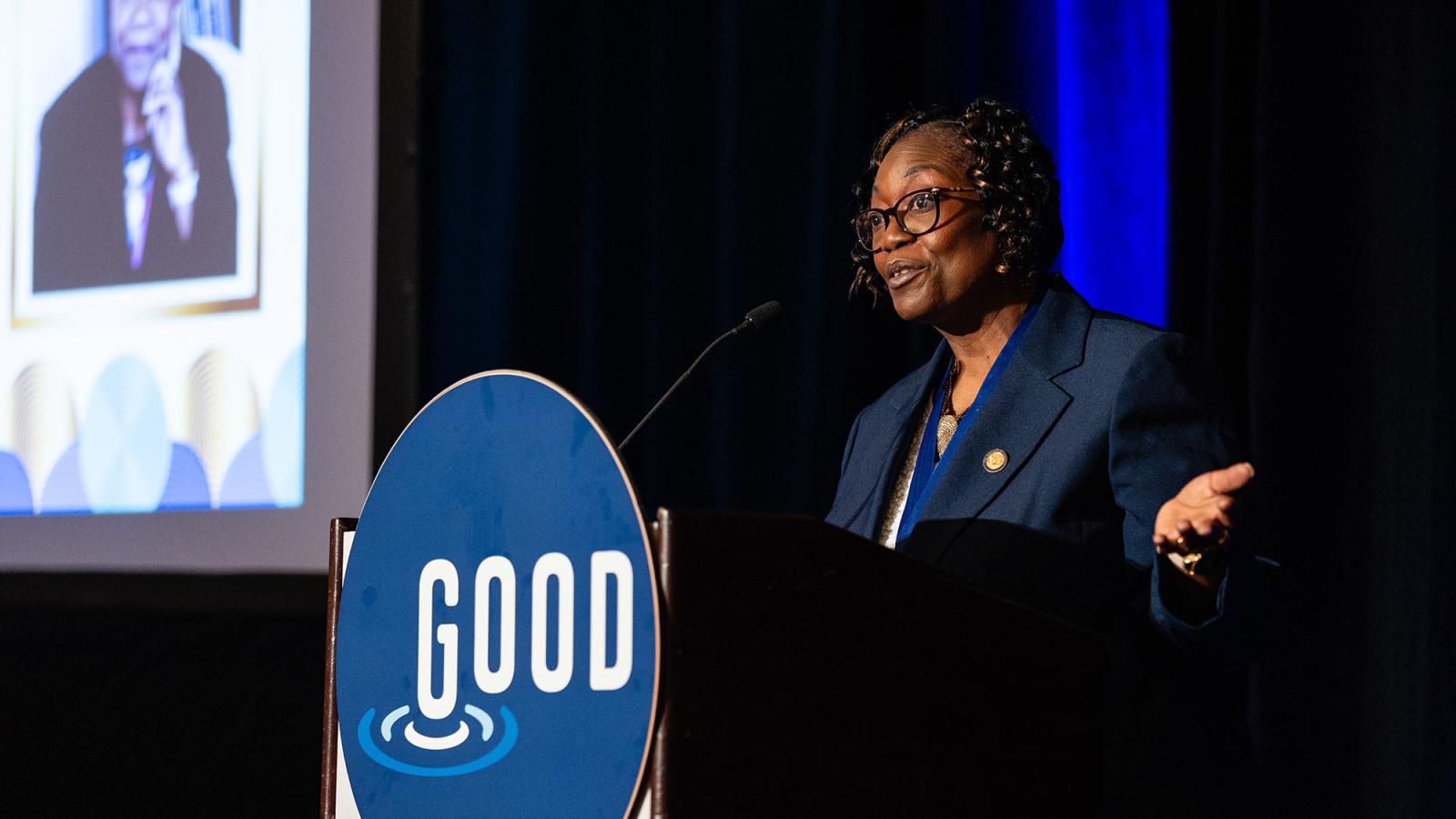
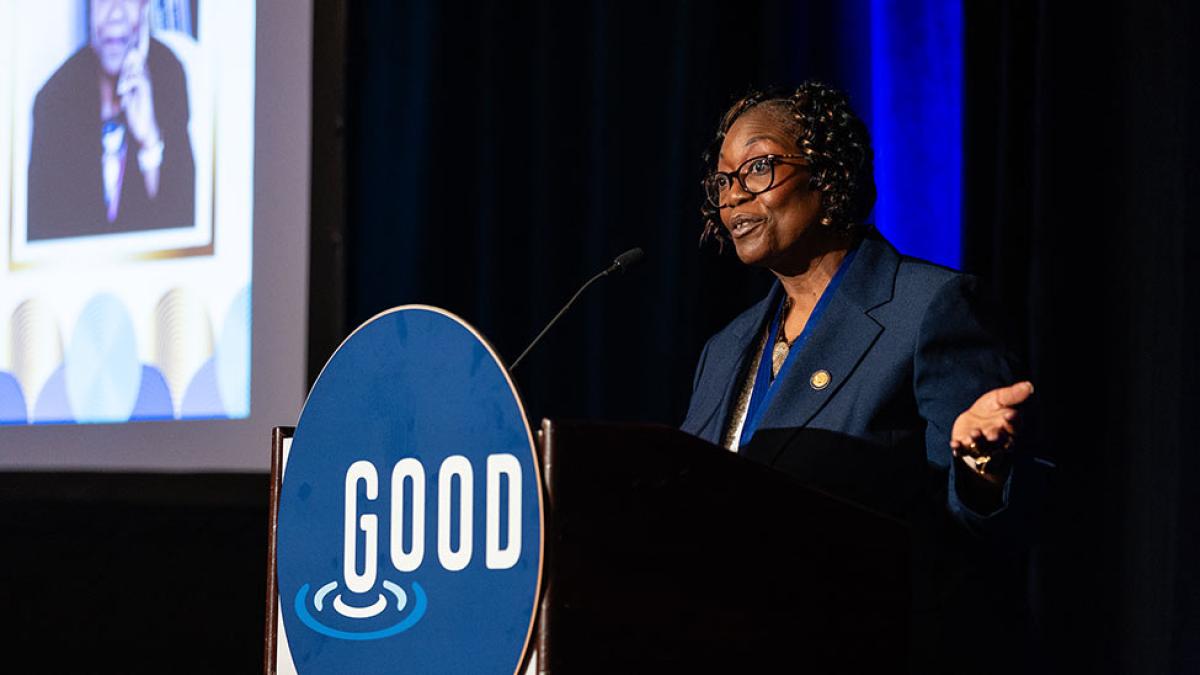
Award Recognizes Outstanding Public Service by an Employee
Tresmaine R. Grimes, Ph.D., dean of the Dyson College of Arts and Sciences and the School of Education, and interim dean for the Sands College of Performing Arts at Pace University, was nominated for the Jefferson Award for Outstanding Public Service by an Employee.
Multiplying Good, the nonprofit organization that administers the Awards, announced the nominees at its National Celebration of Service earlier this month. Uniting over 200 service leaders from various media partners and corporate partners from across the country, the gathering was a testament to the organization's commitment to celebrating service, leadership, and excellence.
Nominated by Pace University, Dean Grimes was acknowledged for her work within her organization and community. Grimes has dedicated her career to improving the lives and mental health of others. In 2004, she had the opportunity to join a delegation of American mental health professionals who traveled to South Africa to study the impact on mental health of the South African population as it relates to apartheid-related trauma, sexual assault, and HIV/AlDS.
Dr. Grimes has been actively involved in service to her community for much of her life. In 2012, she established her own nonprofit organization, Sarah's Daughters Ministries, which focuses on supporting local organizations that assist women who are recovering from relationship violence and providing ministry to women and men to help them grow spiritually and find the best path forward.
“It's a tremendous honor to be nominated for the Jefferson Award for Outstanding Public Service by an Employee,” said Dean Grimes. “Throughout much of my life, I've embraced the notion that it's important to serve others and give back to others. I am extremely honored that someone would consider the actions I take worthy of acknowledgment.”
Dean Grimes received a Bachelor of Arts from Yale University with a double-major in Afro-American Studies and Psychology, a Master of Arts in Psychology from the New School for Social Research, and a M.Phil. and Ph.D. in Developmental Psychology from Teachers College, Columbia University.
Her teaching career began at South Carolina State University as a member of the Psychology and Sociology Department there. During her nine-year tenure at S.C. State, Grimes received promotion to the level of associate professor and served as chair of her department for four years.
She arrived at Iona College in 2000 as an adjunct professor of psychology and moved through the ranks again to become a tenured associate professor of Psychology. She was promoted to the position of assistant vice president for academic affairs at Iona College in 2007 and served in the position for 8 years. Dr. Grimes served as vice president for academic affairs and dean of faculty at Bloomfield College in Bloomfield, New Jersey from September 2015 until August 2019.
Dean Grimes has used her professional skills to assist many organizations, including the American Psychological Association, the Educational Testing Service, and the College Board. She has received many awards, including Teacher of the Year from the South Carolina Psychological Association and the Standing on Their Shoulders Award from the Bronx Alumnae Chapter of Delta Sigma Theta Sorority, Inc.
Over the past five decades, the list of Jefferson Award recipients has included hundreds of national figures — both public and private —more than 65,000 unsung heroes, and tens of thousands of employees and young people that represent the good that is happening in communities across the country. The list of winners includes an impressive who’s who of cultural icons, political dignitaries and everyday community members and volunteers.
"For over half a century, the Jefferson Awards has been dedicated to changing the narrative by highlighting the incredible acts of goodness happening all around us,” said Benita Fitzgerald Mosley, CEO of Multiplying Good. “When we shine a spotlight on these acts of service on such a grand stage, their impact resonates throughout the nation, inspiring millions and prompting action."
"Jefferson Award recipients exemplify the pinnacle of selfless service," Mosley continued. ''Through sharing their narratives, we not only motivate them to continue their remarkable work but also ignite inspiration in others to create positive change."
In her remarks, Dean Grimes congratulated her peers and spoke about establishing a nonprofit that helps the faith community understand and get to the truth of domestic violence.
“Sarah’s Daughters Ministries is focused on helping women understand that love shouldn’t hurt,” Dean Grimes said. “If you find yourself or find a friend or someone you love in a relationship that's violent take a breath, control your rage, and figure out how you can help them.”
“I applaud Dean Tresmaine Grimes for this extraordinary honor,” said Joseph R. Franco, PhD, Pace University Provost, who attended the National Celebration Service event. “Her dedication to community and public service inspires our fellow colleagues in the Pace Community. She is truly deserving of this great honor.”
About Multiplying Good
Multiplying Good is a national nonprofit that believes in the power of service to others to unleash potential, inspire individuals, and transform lives. Multiplying Good fuels personal growth and leadership development through a continuum that starts with engagement and culminates in recognition. It has offices in 11 communities across the country, delivering on-the-ground impact where it is needed most. Founded in 1972 by Sam Beard, Jacqueline Kennedy Onassis, and Senator Robert Taft, Jr., the organization has recognized the extraordinary public service of thousands with its Jefferson Award. To learn more, visit MultiplyingGood.org or follow Multiplying Good on Facebook.
About Pace University
Since 1906, Pace University has been transforming the lives of its diverse students—academically, professionally, and socioeconomically. With campuses in New York City and Westchester County, Pace offers bachelor, master, and doctoral degree programs to 13,600 students in its College of Health Professions, Dyson College of Arts and Sciences, Elisabeth Haub School of Law, Lubin School of Business, Sands College of Performing Arts, School of Education, and Seidenberg School of Computer Science and Information Systems.
Grant Opportunity: Environmental Entrepreneurship
Do you have an innovative solution that can make a positive impact on the environment? Share your ideas by December 19 for the chance to win a $15,000 grant! Join The Front Yard at Pace University and Speedemissions in addressing climate change, protecting the planet, and slowing threats to Earth's ecosystem.


Pace University students and faculty interested in protecting the planet from climate disasters are being asked to make climate change innovation a priority. To help make that dream a reality, Speedemissions, in partnership with The Front Yard at Pace University, has established the Project Planet U.S.A initiative.
Through the Project Planet U.S.A initiative, environmental entrepreneurs with potential tech solutions geared toward addressing climate change may share their concepts, innovative ideas, or solutions for a chance to win a cash grant in the amount of $15,000 and in-kind professional services consisting of mentoring, public relations, and network connections.
Applications are due by Tuesday, December 19. Up to two winners—individuals or groups—will be selected. Winning entries will retain all product, concept, or idea rights.
About The Front Yard at Pace University: The Front Yard, a cutting-edge educational platform, seeks to develop an advanced "Tool Box" for Pace University's students, alumni, and faculty to support entrepreneurial and innovative ideas by establishing connections with companies and organizations to foster term long-term relationships, joint ventures, partnerships, and sponsorships.
About Speedemissions: Founded in January 2001, SpeedEmissions has conducted over 2.5 million vehicle emission inspections and 1.25 million vehicle safety inspections, pioneering the "Vehicle Test, Only" store model to prioritize customer service and inspection accuracy. This test-only model means that the company’s emission testing stores do not repair cars that fail emission and safety inspections. Speedemissions has been working to protect the environment from toxic automotive pollutants for decades.
More From Pace
This spring, Pace University joined a winning collaboration chosen by New York City Mayor Eric Adams and The Trust for Governors Island that will create a world-leading climate solutions center on the 172-acre island in the heart of New York Harbor.
Executive Director and founder of the Center of Sustainable Business Steven Mezzio and Pace alumnus Joseph Kenner '02 along with Alejandra Veltmann and Jose Ignacio Morejon co-published an article in CPA Journal about the growing ESG movement, and how small and medium sized business can rise to the challenge.
The Pace Entrepreneurship Studio supports new startups, from ideation to funding—from conception to operation. Our mission is to teach you the "how" and to support the "what"—providing students and alumni with a complete blueprint for establishing successful businesses.
Entrepreneurial Insights with Isaiah Jimenez '23
In this episode of The Lubin Link, Isaiah Jimenez '23 discusses his passion for entrepreneurship, why he believes business students should take art classes, and his advice for fellow aspiring entrepreneurs.
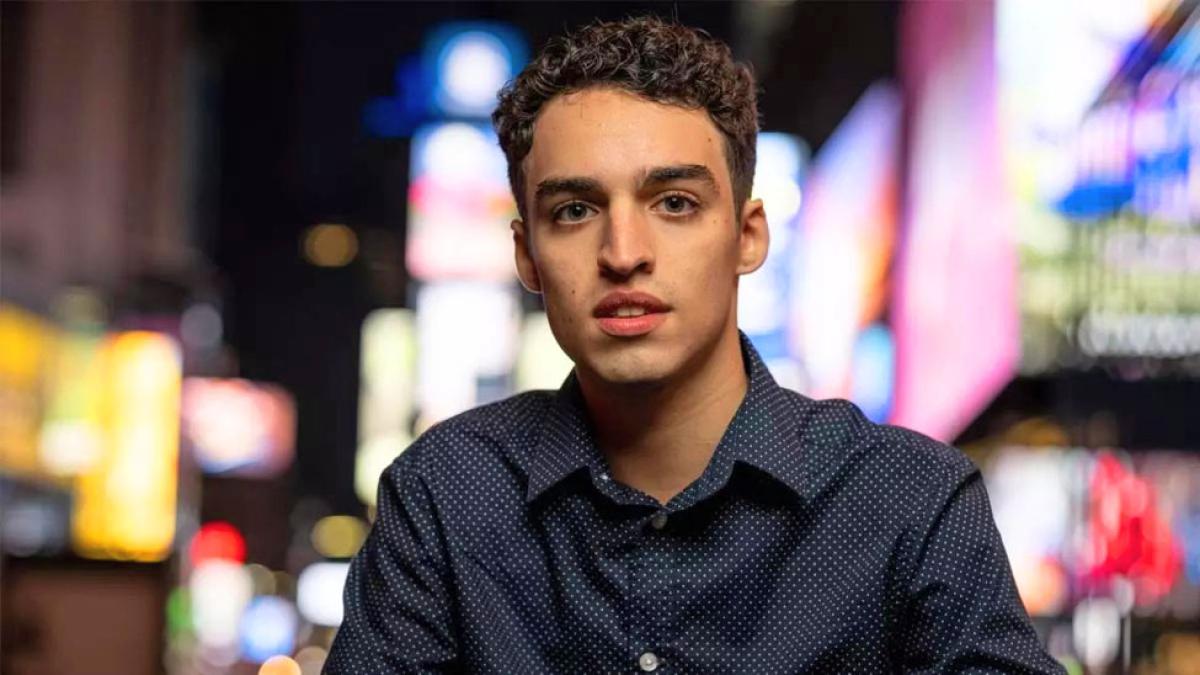
The Lubin Link Podcast
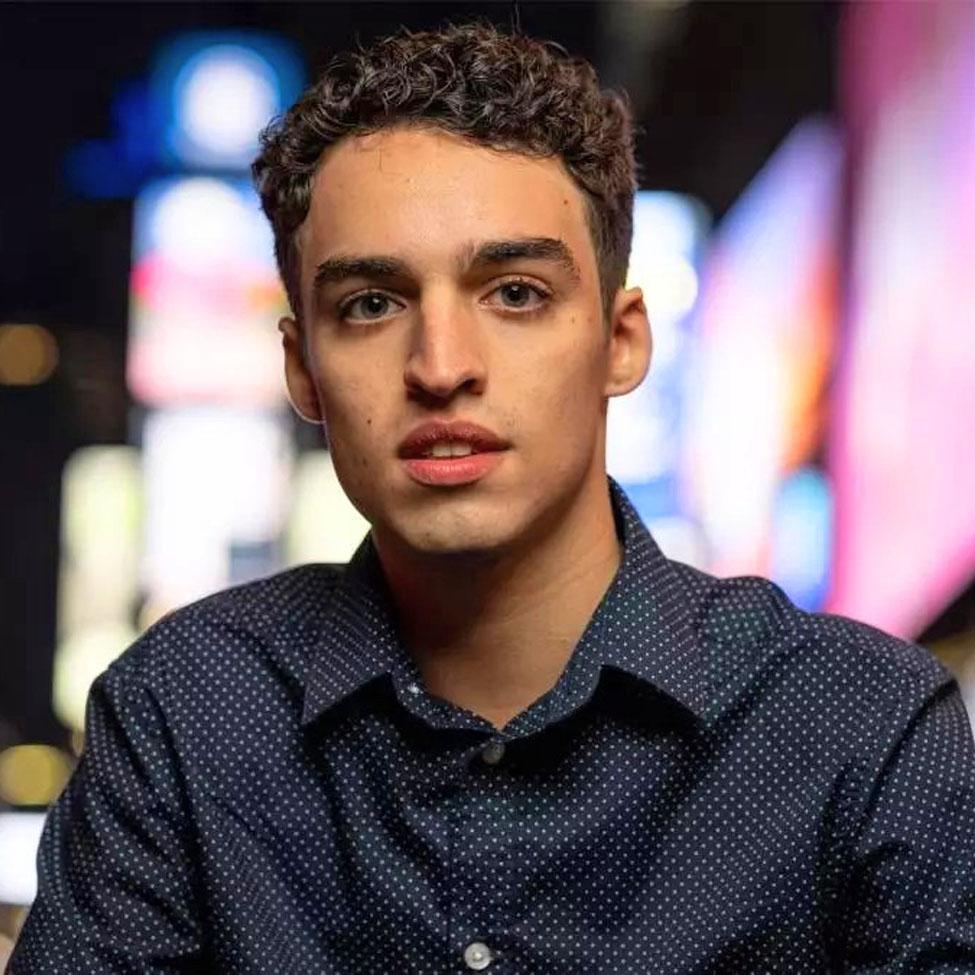
Isaiah Jimenez '23 embodies what it means to be an entrepreneur—and not just because he graduated from the Lubin School of Business with a BBA in Entrepreneurship. Before starting his career in real estate, Isaiah sold Pokémon cards as a kid, started his first business as a teenager, then continued to explore other entrepreneurial ventures throughout college. In this episode of The Lubin Link, Isaiah discusses his passion for entrepreneurship, why he believes business students should take art classes, and his advice for fellow aspiring entrepreneurs.
This episode was recorded on October 3, 2023.
Tune into the Lubin Link podcast to hear how guests went from go-getting Lubin students to successful entrepreneurs, social media mavens, directors, CEOs, and beyond. They offer their best tips to students and share how you can make the most out of your #LubinLife.
NYC Campus: Lounge and Study Spaces
Looking for a place to hang out on Pace's NYC Campus? We got you covered. Here's a comprehensive list of spaces where you can get together with friends and colleagues for quiet study, group projects, and more.


Looking for a place to hang out on Pace's NYC Campus? We got you covered. Here's a comprehensive list of spaces where you can get together with friends and colleagues for quiet study, group projects, and more.
41 Park Row
Open 7:00 a.m.–11:30 p.m.
- Lower Level: Dezer Commuter Den
- 2nd Floor: Student Lounge
- 8th Floor: Student Lounge and Conference Rooms
One Pace Plaza West
Open 24/7
- Classrooms: available as study spaces before 7:00 a.m. and after 9:00 p.m. on Monday–Friday, 24 hours on weekends
- W210: capacity 52
- W211: capacity 26
- W506: capacity 40
W510: capacity 30
W602: capacity 32
- G -Level: Lubin Lobby
- 1st Floor: Open Study Area
- 1st Floor: Student Center when not being used for events
- 2nd Floor: Tech Zone (24/7, 50 seats)
- 4th Floor: Lubin Lounge (24/7) and Study Rooms
- 5th Floor: Group Study Rooms and corridor seating
- 6th Floor: Group Study Rooms and corridor seating
15 Beekman
- Classrooms: available as study spaces before 7:00 a.m. and after 9:00 p.m. on Monday–Friday, 24 hours on weekends
- Room 809: capacity 18
- Room 1009: capacity 32
- 2nd Floor: Dining Seating Areas (24/7)
- 3rd Floor: Faculty and Staff Community Room (before 10:00 a.m. and after 3:00 p.m. on Monday–Friday, anytime on weekends; reservations must be made via 25Live)
- 4th and 5th Floors: Beekman Library. Study spaces available 8:00 a.m.–11:00 p.m. on Monday-Thursday, 8:00 a.m.–10:00 p.m. on Fridays, 10:00 a.m.–5:00 p.m. on Saturdays, and 12:00 p.m.–8:00 p.m. on Sundays. Hours may vary during holidays and exam weeks. Visit the Beekman Library website for more information.
- 6th Floor: Dining Seating Areas (24/7)
- 8th Floor: capacity 64
161 William Street
Open 7:00 a.m.–11:30 p.m.
- 1st Floor Lobby (31 seats)
- 3rd Floor: Lounge Area (8 seats), Rooms 306, 307, and 308
- 12th Floor: Lounge Area (27 seats)
- 13th Floor: Lounge Area (44 seats)
- 14th Floor: Lounge Area (41 seats)
- 15th Floor: Lounge Area (6 seats)
- 22nd Floor: Lounge Area (9 Seats)
More From Pace
Imagine dancing with Doja Cat. Now imagine doing it in front of 865,000 people. For Joanne Daquigan, Jada Clark, and Tiffani Rusell that dream became reality. Last month, they and several other members of the Pace Commercial Dance community performed alongside some heavy-hitting A-listers at MTV's VMAs.
Pace University Career Services on Friday hosted one of its signature events: the Fall 2023 Job and Internship Career Fair. With record-breaking student turnout, it was one of the largest Job Fair in the University’s history.
On Wednesday, October 11, Political Science and Peace and Justice Studies students Ellis Clay ‘25, Antje Hipkins ’24, and Jasmine Cintron Soto ’25 delivered statements to the United Nations General Assembly First Committee, a forum focused on global disarmament and international security.




